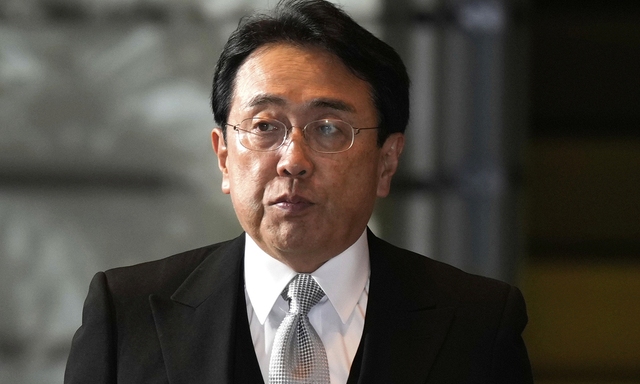
Ryosei Akazawa, newly appointed Minister in charge of Economic Revitalization, arrives at the prime minister's office in Tokyo, on Oct. 1, 2024. Photo: VCG
Japan's chief negotiator with the US on tariffs has canceled a visit to Washington over US plans to have a presidential order include stepped-up Japanese purchases of American rice, Nikkei Asia reported on Saturday.
The Japanese side strongly objected, multiple government officials here told Nikkei on Friday.
Lead tariff negotiator Ryosei Akazawa, minister of state for economic and fiscal policy, canceled the trip, which would have begun Thursday, the report said.
According to Kyodo News, during Akazawa's planned visit, Tokyo had intended to request the Trump administration to include special measures aimed at alleviating the burden of reciprocal tariffs and a reduction in auto tariffs in an executive order. However, Washington offered no concrete assurances.
For Japan, raising the share of US agricultural products by adjusting its import structure—while keeping the total import volume unchanged—is essential to avoid domestic backlash, particularly from the agricultural sector, Wang Guangtao, an associate research fellow with the Center for Japanese Studies at the Shanghai-based Fudan University, told the Global Times on Sunday.
If the total import volume expands, Japanese agricultural groups are likely to perceive it as a threat to their interests, Wang added.
The American side also told Japan that it was considering including a reduction in Japanese tariffs on agricultural products in the presidential order. An executive order is a presidential directive to US government agencies, and Japan strongly protested, arguing that including actions to be undertaken by the Japanese government constituted interference in internal affairs, according to Japanese officials. In addition, an agreement reached in July does not make Japan reduce its own tariffs, Nikkei reported.
The White House said Japan will immediately increase imports of US rice by 75 percent, with a major expansion of import quotas in July. However, Japanese Prime Minister Shigeru Ishiba has said that Japan will not sacrifice the agriculture sector for the sake of supporting the auto industry in the trade talks with the US. While admitting that expanding rice imports is an option, Ishiba said it should be done on the premise of reforming the rice policy's structure itself, the Japan Times reported.
It became clear that there are points that should still be discussed at the working level, Akazawa told a news conference Friday. I canceled the trip while those talks continue.
It will probably work out that I will go to the US one more time, he said.
Akazawa had hoped to secure a commitment from the US to ease tariffs on Japan during his visit, only to abruptly cancel the trip Thursday morning in light of the wide gap between the two sides, Nikkei reported.
Wang noted that several key disputes remain in Japan-US trade talks. Chief among them is mutual suspicion and distrust. The US has requested Japan to formalize its commitment of $550 billion in investment into the US into a written and formal agreement. However, Japan has not yet received corresponding written commitments from the US side, especially regarding the prior US oral assurance that the 15% tariff on Japanese automobiles would not be immediately enforced. As a result, Japan insists on the principle of reciprocity, arguing that if Tokyo must put its investment commitments in writing, the US should also provide a clear written assurance on the tariffs, Wang said.
Secondly, at this stage, the two sides have not yet reached a consensus on specific details. Tensions over agricultural goods persist, and under Trump-era tariff policies, turning verbal understandings into a written agreement will require more negotiation, risking stronger backlash from Japanese agricultural interest groups, Wang noted.
